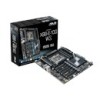Asus X99-E-10G WS X99-E-10G WS User Guide for English. - Page 109
PCH Storage Configuration, Hyper kit Mode [Disabled], S.M.A.R.T. Status Check [On]
 |
View all Asus X99-E-10G WS manuals
Add to My Manuals
Save this manual to your list of manuals |
Page 109 highlights
3.6.3 PCH Storage Configuration While entering Setup, the BIOS automatically detects the presence of SATA devices. The SATA Port items show [Not Installed] if no SATA device is installed to the corresponding SATA port. Scroll up or down to display other BIOS items. Hyper kit Mode [Disabled] Disable this option for M.2 devices. Enable this option for "ASUS Hyper kit" card. Configuration options: [Disabled] [Enabled] S.M.A.R.T. Status Check [On] SMART (Self-Monitoring, Analysis and Reporting Technology) is a monitoring system that shows a warning message during POST (Power-On Self Test) when an error occurs in the hard disks. Configuration options: [On] [Off] SATA Controller 1 SATA Controller 1 Mode Selection [AHCI] This item allows you to set the SATA configuration. [Disabled] Disable the SATA function. [IDE] Use SATA hard disk as Parallel ATA storage devices [AHCI] Set to [AHCI] when you want the SATA hard disk drives to use the AHCI (Advanced Host Controller Interface). The AHCI allows the onboard storage driver to enable advanced Serial ATA features that increases storage performance on random workloads by allowing the drive to internally optimize the order of commands. [RAID] Set to [RAID] when you want to create a RAID configuration from the SATA hard disk drives. ASUS X99-E-10G WS 3-39 Chapter 3















